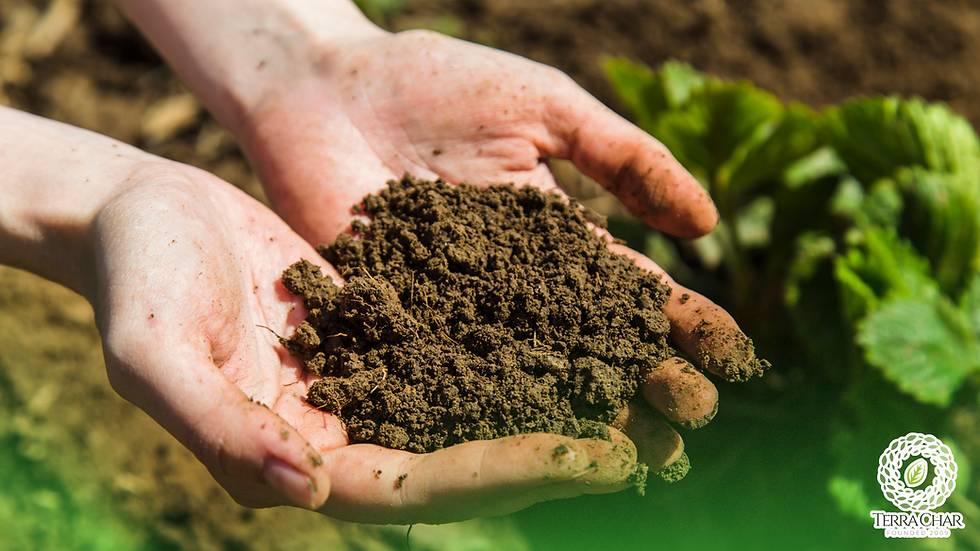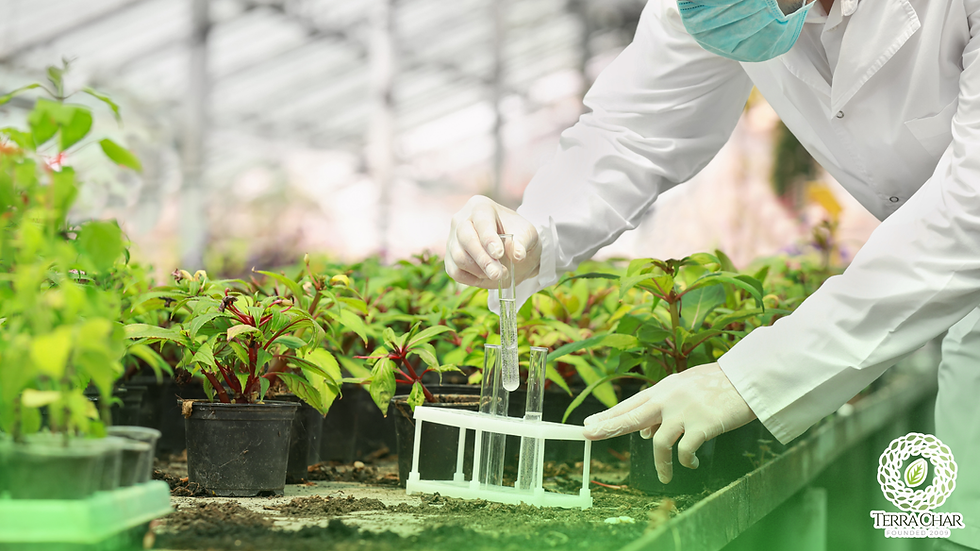How Biochar Works — The Science Behind Soil Regeneration
- Terra Char News

- Nov 10, 2025
- 3 min read
Why Healthy Soil Is the Foundation of Life
Soil is more than dirt beneath our feet — it’s a living, breathing ecosystem that supports nearly all terrestrial life. Yet modern agriculture has pushed this ecosystem to its limits. Years of intensive farming, erosion, and chemical dependency have left millions of acres depleted of organic matter and nutrients.
Biochar offers a powerful, science-backed way to rebuild soil health naturally. Through its unique physical and chemical properties, biochar helps soils regain fertility, improves water efficiency, and restores the biological networks that make land productive and resilient.

The Science of Pyrolysis
The process that gives biochar its regenerative qualities is called pyrolysis — the thermal decomposition of biomass in a low-oxygen environment. This process transforms organic waste such as wood, crop residues, or agricultural byproducts into a carbon-rich material that’s both stable and porous.
Unlike compost, which decomposes and releases carbon back into the atmosphere, biochar’s molecular structure makes it resistant to decay. It stores carbon long-term, while providing structural and nutrient benefits to the soil.
At TerraChar®, this process is precisely controlled to produce consistent, high-carbon biochar with optimal porosity and low ash content — ensuring predictable results in every application.
Inside the Soil: Biochar’s Transformative Role
When mixed into soil, biochar behaves like a micro sponge. Each granule contains millions of tiny cavities that hold onto water, air, and nutrients. These cavities also provide homes for soil microbes — the invisible engineers that break down organic matter and make nutrients available to plants.
Over time, this combination improves soil structure, boosts root growth, and creates a self-sustaining soil ecosystem. Biochar’s cation exchange capacity (CEC) helps bind essential nutrients, preventing them from washing away during heavy rains or irrigation.
Water Retention and Drought Resistance
Biochar significantly enhances the soil’s ability to retain moisture. In regions prone to drought or sandy soils with low water-holding capacity, this can reduce irrigation needs by up to 20–30%.
By maintaining moisture near the root zone, biochar supports healthier plant development and consistent yields — even under unpredictable climate conditions. For many farmers, this means less water, less fertilizer, and more resilience.
Reducing Runoff and Improving Water Quality
Nutrient runoff, particularly nitrate leaching, is one of modern agriculture’s most pressing environmental concerns. Biochar helps address this issue by capturing nitrates and holding them in the soil matrix. This not only improves fertilizer efficiency but also protects groundwater and downstream ecosystems from contamination.
A Systems Approach to Regenerative Agriculture
Biochar is not a standalone solution — it’s a cornerstone of regenerative farming systems. When used alongside compost, cover crops, and reduced tillage, biochar amplifies the benefits of each practice. The result is a living soil that continuously improves its own fertility, stores carbon, and supports healthy, nutrient-rich crops.
TerraChar®’s biochar products are designed to integrate seamlessly into these systems, offering reliable performance backed by measurable environmental outcomes.
From Science to Sustainability
The science behind biochar is as elegant as it is practical. It takes what would otherwise be waste — biomass — and turns it into a long-lasting tool for healing our planet’s soils.
Through continued innovation and partnerships, TerraChar® is committed to helping farmers, researchers, and communities unlock the full potential of this remarkable material.
Healthy soil means a healthier planet. With biochar, that future is within reach.
Follow us on linkedin: https://www.linkedin.com/company/terra-char/


Comments